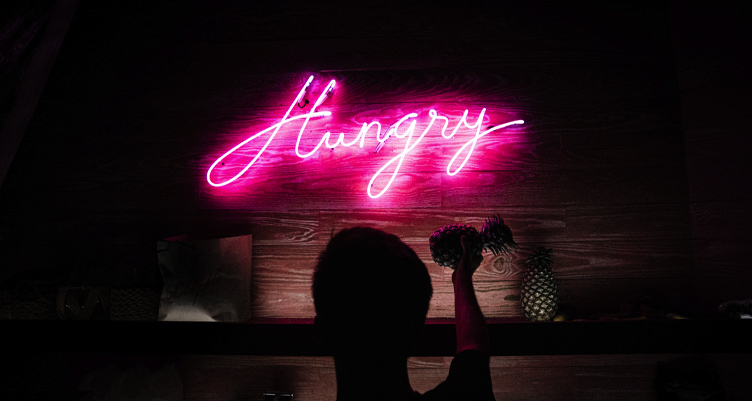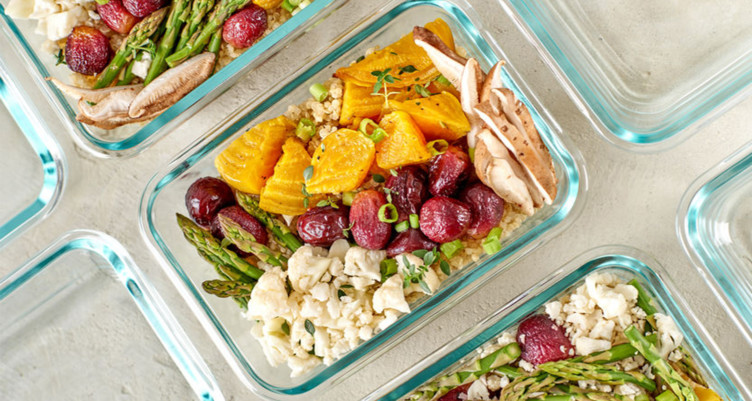Constantly Snacking? Nutrition Expert Shares How to Eat Mindfully

- Working from home? It’s mega tempting to eat all day long when you’re just a few feet away from the kitchen.
- We asked a nutrition expert how to manage your eating routine without wrecking your wellness goals.
- Find out how to create a schedule that works for you, plus tips to identify stress-eating vs. actual hunger pangs.
You’re home. So is your fridge. Whether you’re bored, stressed or working from home, it’s tempting to eat throughout the day when you’re just a few feet away from the kitchen. We spoke with Jacqueline Hale, IFPA Nutrition Specialist and owner of Jackie Yvonne Nutrition, about how to manage your eating routine, how to stop stress-eating and tips to stay home without snacking all day.
Is it bad to eat all day?

It’s not bad to eat. You need food! The real question is, are you really hungry?
If you’re eating because you’re bored, stressed or avoiding your to-do list, take a closer look at your eating habits and see how they measure up to your goals. Here are some points to consider if you’re snacking all day:
- Your time: It’s tough to return to a task after you’ve been interrupted — and at home, food is its own distraction. If you’re working from home, snack breaks can actually make your workday feel more stressful. A study from the University of California, Irvine, found that interruptions at work contributed to a higher workload; more stress, frustration and pressure; and greater effort.[1]
- Your blood sugar: When you eat, your body breaks down carbohydrates into a type of sugar called glucose. In response, your body releases a hormone called insulin. Insulin tells your cells to absorb glucose and turn it into energy. The problem is that overeating interferes with your body’s ability to regulate your blood sugar. This may increase your risk of insulin resistance and diabetes.[2] [3]
- Your energy intake: Eating all day increases the likelihood that you’re going to eat more calories than your body needs. This is especially true if you’re noshing on hyperpalatable snack foods that make you want to finish the entire bag. Learn more about how your metabolism works and why you don’t want to eat more than you need.
How to stop eating so much when you’re staying home
Your eating habits can change over time, depending on factors like your activity levels, health goals and lifestyle. And, just spitballing here, if you suddenly find yourself spending a lot of time at home and having to adjust to being less active than usual, you may have to retrain your body and behaviors to meet your new needs. Here’s how to make that happen.
Set a schedule

Hale recommends setting an eating schedule and creating a menu around your day. “I know this sounds like work,” she says, “but having a schedule of meals and snacks regulates when we eat and how much we eat to avoid overeating.”
There’s no right or wrong eating schedule here — do what works for you, and schedule those eating breaks into your day. If you’re used to having breakfast at 7 a.m., a mid-morning snack, lunch at noon and dinner around 5 p.m., stick with your schedule. The trick is to fill the time between meals with activities that aren’t eating, like working, exercising or practicing a new skill. You have time for hobbies now!
Now is also a great time to try intermittent fasting, in which you skip breakfast and only eat within a specific window of time. This style of eating is an easy way to make sure you’re not grazing throughout the day, and you get extra benefits — like managing inflammation, boosting focus and curbing cravings. Learn how to start intermittent fasting.
Plan your meals

“We are still in control of what we put in our pans,” Hale says. She recommends creating a menu for a week or two, and shopping based on that menu. Keep these points in mind:
- Add produce to your menu: “While many of us are limited in travel, fresh produce is still available, and we need the nutrients from fresh veggies and fruits,” Hale says. If your grocery store is low on fresh produce, frozen is just as good. “If your local store only has boxed and canned items, select the options with the lowest sodium content,” Hale says.
- Look for better-for-you snacks: A nutritious snack makes you feel energized and satisfied. Keto-friendly snacks, like hard-boiled eggs, raw nuts and Bulletproof Collagen Protein Bars, are packed with quality fats that keep you going strong between Zoom meetings.
- Consider your macros: Protein, fat and carbs (or macronutrients) are the fuel your body needs to keep your immune system strong, your brain sharp and your energy high.
Meal prep is your friend

Take your planning a step further with meal prepping — aka a gift for future you that you can eat. If you already know what you’re going to eat, you’re less likely to give into snack foods instead of a balanced meal, Hale says. This is extra valuable “if you have a break between meetings or you are cooking for your entire family daily,” she says.
Meal planning also minimizes waste because it helps you use the foods you have at home and makes it easy to see what you need to buy at the store (or order online). That means less time at the grocery store, which is a big plus when you’re practicing social distancing.
“Some of my favorite meals to prep include soups and stews, stir fry meals, slow cooker rice and chicken meals, baked salmon and roasted veggies and tuna salad,” Hale says. Get more recipe ideas at the Bulletproof Recipes page.
One final note about planning your meals: Hale suggests cutting back on carbs if your activity level is lower than usual. One easy way to do this is to eliminate carbs from one of your meals, like dinner. “I recommend this for many of my clients as well, most of whom work in high-performing careers and are new to working from home daily,” she says.
Recognize why you’re eating

There’s a difference between eating because you’re hungry, eating because you’re stressed and eating because you’re bored.
Food makes you feel good, especially when you eat something that tastes delicious and maybe even reminds you of childhood. The thing is, eating when you’re bored or stressed can easily develop into a learned behavior.
If you feel like you need to raid the pantry every time your mind wanders or you’re feeling anxious, you’re building a habit. Your mind starts to associate negative feelings with the need for food. And instead of fueling your body, you fuel eating habits that don’t meet your health goals.
Stay centered. Shop Bulletproof Zen Mode now
How to read your hunger cues

Take a step back and ask yourself if you’re actually hungry. This is a deceptively simple question because it’s hard to read hunger cues. Some people feel constantly hungry, while others don’t feel hungry at all when they’re stressed.
One easy way to tell if you’re hungry is to ask yourself if you’re feeling physical or psychological signs of hunger.[4]
- Physical signs of hunger: Hunger increases gradually. You feel sensations in your body like a growling stomach, low energy, a headache or trouble focusing.
- Psychological signs of hunger: You suddenly want a specific type of food. The feeling is urgent. It happens in response to a negative thought or emotion like anger, boredom or stress.
If you’re feeling psychological hunger — like you suddenly want to eat something sweet when you’re frustrated — see how you feel after doing something else. Instead of feeding your cravings, drink a glass of water, go on a walk, call a friend or try one of these self-care ideas.
If you’re concerned about your eating habits or have a negative relationship with food, talk to your doctor. Everyone has different needs and responds to stress differently. If you’re struggling right now, you’re not alone. This page lists mental health resources, collected by the National Institute on Mental Health.
What if I’m constantly hungry?

If you can’t stop thinking about food, take a step back and make sure you have your nutritional bases covered. Your body might legitimately be asking you for more food. Are you eating enough vegetables? Are you eating quality fats, protein and clean carbohydrates? If you’re on a keto diet, are you eating enough quality fat to stay in ketosis — or is your body asking you for more carbs?
Related: How to Start Keto and Why Cyclical Ketosis Is Better
When you do eat, limit distractions, and don’t eat at your desk. Instead, go to a designated space to enjoy your food, whether you’re sitting down at your kitchen table or taking your lunch break outside — bonus points if you’re getting extra sunshine. Designating a place to eat is an easy way to make sure you’re not grazing on snacks all day or eating more food than you need. Here’s another method experts recommend: eat until you’re satisfied, and stop when you’re about 80% full (an approach to eating called hara hachi bu).[5]
One effective way to curb cravings: eat more quality fats. Fat is ultra-satiating, which is one of the reasons Bulletproof Coffee is so effective. It’s made with grass-fed butter and Brain Octane MCT oil, a brain-boosting fat that keeps you fueled and focused, not hangry.
Everyone has different diet and nutrition needs, and it’s okay to take some time to figure out what your new normal looks like right now. Rather than thinking about what’s “right” or “wrong,” keep tabs on how you feel and what you need. Your body needs sunshine, movement and whole-food nutrition. Not sure where to start? Check out the Bulletproof 30 Day Upgrade for a step-by-step guide to get more energy, eat nourishing foods and feel amazing in 30 days. Download your copy below.
Give us 30 days and we'll give you more energy. Get tips, recipes and more that will help you become the best version of YOU.



